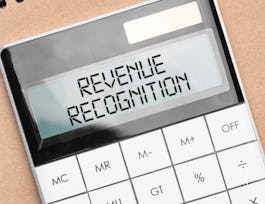This course is for entrepreneurs needing to understand the blockchain and distributed ledger technologies that are fundamentally changing how financial and personal data is handled. The course will discuss blockchain as a distributed ledger and introduce distributed consensus as a mechanism to maintain the integrity of the blockchain. The other revolutionary technologies that are changing the world are artificial intelligence and machine learning. You will learn about the three major types of AI algorithms: supervised and unsupervised machine learning, as well as reinforcement learning.


How Entrepreneurs in Emerging Markets can master the Blockchain Technology
This course is part of Fintech Startups in Emerging Markets Specialization
Taught in English
Some content may not be translated

Instructor: Co-Pierre Georg
5,808 already enrolled
Included with 
Course
(39 reviews)
What you'll learn
How the blockchain. distributed ledger and artificial intelligence technologies work and the applications of these technologies.
The benefits and considerations when using blockchain and how to decide if blockchain is the right solution to a problem.
Skills you'll gain
Details to know

Add to your LinkedIn profile
8 quizzes
Course
(39 reviews)
See how employees at top companies are mastering in-demand skills

Build your subject-matter expertise
- Learn new concepts from industry experts
- Gain a foundational understanding of a subject or tool
- Develop job-relevant skills with hands-on projects
- Earn a shareable career certificate


Earn a career certificate
Add this credential to your LinkedIn profile, resume, or CV
Share it on social media and in your performance review

There are 4 modules in this course
This week looks at the plumbing of current and future financial systems. Firstly we will look at our current financial infrastructure and how it facilitates the safe and efficient functioning of the financial system. We will also look at how our current infrastructure falls short and why this is an opportunity for fintech companies. We start with what banks and other financial intermediaries are, and why we regulate them. Then we will talk about how our financial infrastructure connects financial intermediaries and ensures that they can trade with one another. Secondly this week, we turn to the plumbing of the financial system of the future, which can be summarized in one word really, blockchain. Before going into details about how exactly the blockchain works, it makes sense to talk about how blockchain will disrupt our existing financial system. It's then time to take a deep dive into the cryptographic foundations of the blockchain. We will talk about public private key cryptography and explain exactly why cryptography makes the blockchain so secure. We end off the week with a complete overview of the data structures used in almost all blockchains. This will give you a thorough understanding of the innermost workings of the blockchain. Equipped with these tools, we can then take on the remainder of the course.
What's included
10 videos2 readings3 quizzes1 peer review1 discussion prompt
Welcome to the second week of our course. This is the week where it gets real. We will finally have all the ingredients we need to fully grasp what the blockchain is. We start the week off by explaining single and double entry bookkeeping. It's important to understand why double entry bookkeeping improved the integrity of ledges in Italy in the 14th century, to truly appreciate how novel and revolutionary the blockchain is. For hundreds of years, double-entry bookkeeping was the method of choice when it comes to financial accounting. In double-entry bookkeeping, the two parties in a transaction each update their books, which provides some security against fraudulent actors. With the emergence of the distributed ledger technology and the blockchain however, we have seen a fundamental paradigm shift in accounting. The accounting perspective is very useful when we want to understand the blockchain as a distributed ledger. Distributed ledger is shared among a number of counterparties who want to transact with one another. A blockchain collects a number of transactions in the block, and through clever combination of cryptography and incentive schemes, ensures that these blocks cannot be altered. Each block contains a reference to the previous block, which is how a chain of blocks turns into a blockchain. We will discuss the different consensus mechanisms and cover both proof of work and proof-of-stake in detail. You will understand both the theory behind them and how they are applied in different block chains. This is an exciting week so let's get started.
What's included
9 videos1 reading2 quizzes
Welcome to the third week of our course. This week we will explore more technology that is also disrupting the financial services industry, specifically artificial intelligence or AI. We will actually get our hands dirty and cover the three streams of AI, supervised and unsupervised machine learning, as well as reinforcement learning. All three methods are widely used in the financial services industry already, and we kick the week off by giving you a bird's-eye view of the possible applications of AI in finance. Then we turn to unsupervised machine learning, which is mainly used to cluster large amounts of high dimensional and unstructured data. This has many applications in the financial services industry. Once we have covered unsupervised learning, we then dive into supervised machine learning, which is a brilliant way to classify large amounts of data. A supervised machine learning algorithm must be trained on the training data set, which is often historical data. Once properly trained, the algorithm can then correctly classify patterns in new data, which is why supervised machine learning is so powerful. The idea of training data is then taken one step further in reinforcement learning, where algorithms learn from their interactions with the environment just like a human would. Reinforcement learning is an immensely powerful tool, and many big Wall Street firms are heavily investing into AI trading algorithms that really use reinforcement learning at their heart. Once we have all this heavy material covered, it's time to treat ourselves. So, at the end of this week, you will meet a number of guest lecturers from the financial services industry who will explain to you how their companies are successfully using AI in their business. This is a big week, where we look beyond the blockchain and to the second big pillar of the Fintech revolution, AI and machine learning.
What's included
10 videos1 reading2 quizzes
Welcome to the fourth week of our course. So, this week, we turn to applications of the blockchain outside of the traditional financial services industry. Since this is a course on FinTech, we will still focus on applications that have ties either with payment services or other financial services. But the main applications are really outside of finance. The first such application is the new architecture of the Internet, the Web 3.0. The current Internet paradigm, the Web 2.0 is built on uses handing that data to large corporations like Facebook or Twitter, and exchange for free services. But as we've seen with a fake news scandal around the 2016 US presidential election and the Brexit referendum, this business model comes with its disadvantages. The biggest disadvantage is privacy. Once a user post his personal data to for example a social media website, he has no longer control over the data. This is where the blockchain comes in. With a blockchain, is possible to give uses ownership of their data to ensure that they have full control over their personal sensitive information. So, this week, you will learn how the blockchain changes at prevailing Web 2.0 business model, and provides endless possibilities for truly decentralized Internet. We will then talk about possible drawbacks to blockchains, and when it is appropriate to use a blockchain and when it is not. There is as much to do for us this week. So, let's dive right in.
What's included
8 videos3 readings1 quiz1 peer review
Instructor

Offered by
Recommended if you're interested in Finance

University of Cape Town

University of Cape Town

University of Illinois at Urbana-Champaign

Alfaisal University | KLD
Why people choose Coursera for their career




Learner reviews
Showing 3 of 39
39 reviews
- 5 stars
71.79%
- 4 stars
20.51%
- 3 stars
7.69%
- 2 stars
0%
- 1 star
0%
New to Finance? Start here.

Open new doors with Coursera Plus
Unlimited access to 7,000+ world-class courses, hands-on projects, and job-ready certificate programs - all included in your subscription
Advance your career with an online degree
Earn a degree from world-class universities - 100% online
Join over 3,400 global companies that choose Coursera for Business
Upskill your employees to excel in the digital economy
Frequently asked questions
Access to lectures and assignments depends on your type of enrollment. If you take a course in audit mode, you will be able to see most course materials for free. To access graded assignments and to earn a Certificate, you will need to purchase the Certificate experience, during or after your audit. If you don't see the audit option:
The course may not offer an audit option. You can try a Free Trial instead, or apply for Financial Aid.
The course may offer 'Full Course, No Certificate' instead. This option lets you see all course materials, submit required assessments, and get a final grade. This also means that you will not be able to purchase a Certificate experience.
When you enroll in the course, you get access to all of the courses in the Specialization, and you earn a certificate when you complete the work. Your electronic Certificate will be added to your Accomplishments page - from there, you can print your Certificate or add it to your LinkedIn profile. If you only want to read and view the course content, you can audit the course for free.
If you subscribed, you get a 7-day free trial during which you can cancel at no penalty. After that, we don’t give refunds, but you can cancel your subscription at any time. See our full refund policy.

